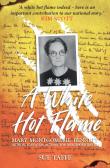 7226298153245049658.jpg
7226298153245049658.jpg
 A White Hot Flame : Mary Montgomerie Bennett – Author, Educator, Activist for Indigenous Justice
single work
A White Hot Flame : Mary Montgomerie Bennett – Author, Educator, Activist for Indigenous Justice
single work
 7226298153245049658.jpg
7226298153245049658.jpg
 A White Hot Flame : Mary Montgomerie Bennett – Author, Educator, Activist for Indigenous Justice
single work
A White Hot Flame : Mary Montgomerie Bennett – Author, Educator, Activist for Indigenous Justice
single work
'Mary Montgomerie Bennett (1881-1961) is an important but under-recognised figure in Australian history. A member of a successful squatting family, she became a voice for reform at a time when Aboriginal Australians had their citizens' rights curtailed by repressive state laws. From her late forties until her death she fought for justice on behalf of the first Australians. She was a teacher, a writer and an advocate. She vehemently opposed the separating, on racial grounds, of Aboriginal children from their families. She put the case, decades before campaigns began, for Aboriginal rights to traditional lands. And she argued for citizenship rights, including equal pay and access to old age pensions for Aboriginal people. A friend described her as 'a white hot flame', relentless in pursuit of a better world for the people she loved. This first full-length biography seeks the sources of Mary's inspiring energy, maintained throughout her life, in her family background and early life experiences.' (Publication summary)
'Sue Taffe first heard of Mary Montgomerie Bennett (1881–1961), or ‘Mimi’, while conducting oral history interviews with Aboriginal and non-Aboriginal activists for an earlier book about the Federal Council for the Advancement of Aborigines and Torres Strait Islanders. Their term for Bennett, ‘spiritual mother’, stuck with the author. In this book, Taffe provides a detailed and convincing biographical interpretation of a young woman growing up between two worlds. The book focuses for almost half its length on Bennett’s early life, between her pioneer Scottish pastoralist father in Australia and her London artist mother in England and Europe.' (Introduction)
'As Sue Taffe notes at the outset of this book, Mary Montgomerie Bennett has been the focus of more than thirty scholarly books or articles, yet she remains something of an enigma. The adoring daughter of a pastoralist who dispossessed Aboriginal people in north Queensland, Bennett became a passionate and tireless advocate for the rights of Aboriginal people relatively late in life. From a historical perspective, Bennett stands out among white humanitarians of the period for her rejection of paternalism, her explicit denunciation of Aboriginal child removal and the policies that encouraged it, and her willingness to support Aboriginal political organisations.' (Publication summary)
'Sue Taffe first heard of Mary Montgomerie Bennett (1881–1961), or ‘Mimi’, while conducting oral history interviews with Aboriginal and non-Aboriginal activists for an earlier book about the Federal Council for the Advancement of Aborigines and Torres Strait Islanders. Their term for Bennett, ‘spiritual mother’, stuck with the author. In this book, Taffe provides a detailed and convincing biographical interpretation of a young woman growing up between two worlds. The book focuses for almost half its length on Bennett’s early life, between her pioneer Scottish pastoralist father in Australia and her London artist mother in England and Europe.' (Introduction)
'As Sue Taffe notes at the outset of this book, Mary Montgomerie Bennett has been the focus of more than thirty scholarly books or articles, yet she remains something of an enigma. The adoring daughter of a pastoralist who dispossessed Aboriginal people in north Queensland, Bennett became a passionate and tireless advocate for the rights of Aboriginal people relatively late in life. From a historical perspective, Bennett stands out among white humanitarians of the period for her rejection of paternalism, her explicit denunciation of Aboriginal child removal and the policies that encouraged it, and her willingness to support Aboriginal political organisations.' (Publication summary)